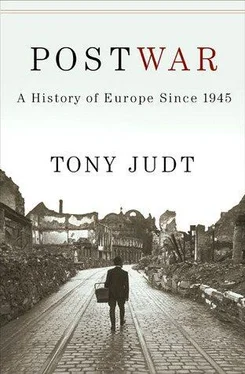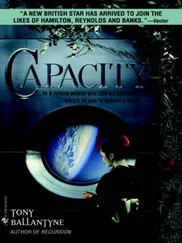These sentiments are unintentionally caricatured in this report from a child’s first class with a Communist primary teacher, in Prague, April 1948: ‘Children, you all know that in America people live in holes dug in the ground and are slaves for a few capitalists, who take all the profit. But in Russia everyone is happy, and we in Prague are very happy too, owing to the government of Klement Gottwald. Now children, repeat loudly with me: “We are very contented and approve the Gottwald government”.’
‘We were intolerant of idiocy in the domains we knew well ’, wrote the French poet Claude Roy, who joined the PCF during the war after an earlier romance with the far Right Action Française, ‘but forgiving of crimes in matters of which we knew little.’
Luc Sante, The Factory of Facts (1998), p. 27.
She was not alone in her Victorian allusions. The British Prime Minister at the time, Winston Churchill, used to remind audiences that he had ridden in the last cavalry charge of the British Army—at Omdurman in the Sudan—in September 1898.
In high-school history textbooks the message of Franco’s ascent to power was unambiguous: ‘The future of Spain united, after three centuries, to the destiny of the past!… The ancient procession has not ceased… Along its path advance the dead and the living, bursting with Christianity, in which a world disoriented and in catastrophic convulsions centers and anchors itself… This is the grand task that God has saved for the Spain of today… An exceptional destiny… Through the Empire, to God!’ Feliciano Cereceda, Historia del imperio espanol y de la hispanidad (Madrid, 1943), pp. 273-74, quoted in Carolyn Boyd, Historia Patria: Politics, History and National Identity in Spain, 1875-1975 (Princeton, 1997), p. 252.
Bing.
Wartime humour in Britain had typically concentrated on material shortcomings, mild sexual innuendo and an undercurrent of resentment at over-privileged American GIs. Sometimes on all three at once: ‘Have you heard about the new Utility underpants? One Yank and they’re off!’
But note that France had more publications devoted to cinema than the other two combined.
Trevor Grundy, Memoir of a Fascist Childhood (1998), page 19.
Rationing in Eastern Europe was not abolished until 1953 in Czechoslovakia, Hungary, Poland and Bulgaria; 1954 in Romania, 1957 in Albania and 1958 in East Germany. But since the Communist economy induced shortage systemically, comparisons with Western Europe are inappropriate.
J. H. Plumb, The Growth of Political Stability in Early Eighteenth-Century England 1675-1725 (London, 1967), p. xvii.
In March 1951, under US pressure, the Dutch, overcoming considerable domestic neutralist sentiment, had reluctantly agreed to double their defense budget and ready five divisions for deployment by 1954.
Based, according to Eden, on an idea dreamed up in his morning bath.
The only explicit restriction placed on German rearmament was an absolute prohibition of any German nuclear arms program, then or ever.
Austrian neutrality was not in the original text; it was inserted by the Austrian parliament during the debate over the State Treaty.
The Americans were not the only ones panicked by displays of Soviet hardware. In 1960 the British Conservative Prime Minister Harold Macmillan privately concluded that ‘They [the USSR] are no longer frightened of aggression. They have at least as powerful nuclear forces as the West. They have interior lines [of communication]. They have a buoyant economy and will soon outmatch capitalist society in the race for material wealth.’
It was left unclear what say, if any, the British would have in their use. At the time (1952) a joint Churchill-Truman communiqué rather obscurely declared that ‘the use of these bases in an emergency would be a matter for joint decision… in the light of circumstances prevailing at the time.’
American pressure on the British and French to withdraw from Suez in November 1956 (see Chapter Nine) had led to fears among the NATO countries that when it came to a war the US might retreat to its hemisphere, abandoning the exposed Europeans. Hence the perceived need in Washington to ‘stand firm’, first on Berlin and later on Cuba, in order to reassure America’s vulnerable allies.
Kennedy’s remark was not only confidential at the time, it was even kept out of the documents from the summit meeting when they were first published thirty years later.
As they were to discover in 1990, their fears were not unfounded.
Anatoly Dobrynin, In Confidence (Times Books, 1995), p. 46. Khrushchev’s aversion to war was genuine. As he wrote to Kennedy on October 26th, at the height of the Cuba crisis: ‘If indeed war should break out, then it would not be in our power to stop it, for such is the logic of war. I have participated in two wars and I know that war ends when it has rolled through cities and villages, everywhere sowing death and destruction.’
As late as 1971, 95 percent of Italy’s senior civil servants had begun their careers before the overthrow of Fascism.
Though in the light of Italy’s earlier history it is not entirely fair to lay the blame for the country’s institutional corruption on American foreign policy. See Eric J. Hobsbawm, The Age of Extremes. A History of the World, 1914-1991 (New York, 1994), pp. 238-39.
In the elections of 1945 the Austrian Communists received just 174,000 votes—5 percent—and elected four deputies to the parliament. Thereafter they played no role in Austrian politics.
On the eve of the 1938 Anschluss there were 189,000 Jews in Vienna. When the city was liberated in 1945 there were fewer than 1,000 remaining.
In Belgium the long-established Catholic Party changed its name to Christian to emphasize its cross-denominational appeal and its more modern, reforming aspirations. In the Netherlands, where intra-Christian distinctions actually mattered, the Catholic Party kept its old title.
To which Resnais responded, ‘Naturally I hadn’t realized that the National Socialist regime would be represented at Cannes. But now, of course, I do.’
‘No-one can take this shame from us.’
With unintentionally revealing hyperbole he described the Nuclear Non-Proliferation Treaty as a ‘Morgenthau Plan squared’.
Many of modern Germany’s senior public figures (including the Federal Chancellor and Foreign Minister at the time of writing—2005) were children of this time, raised in single-parent families by a working mother.
The Portuguese dictator Dr Antonio de Oliveira Salazar was asked in 1968 (seven years into the Angolan revolt that began in February 1961) when he envisaged independence for Portugal’s African colonies, Angola and Mozambique: ‘It is a problem for centuries’, he replied. ‘Within five hundred years. And in the meantime they will have to go on participating in the process of development.’ (See Tom Gallagher, Portugal. A Twentieth-Century Interpretation , 1983, page 200.) But then Salazar’s principled denial of the modern world was legendary: for most of the 1950s he succeeded in keeping Coca-Cola out of his country, something even the French could not manage.
Читать дальше












